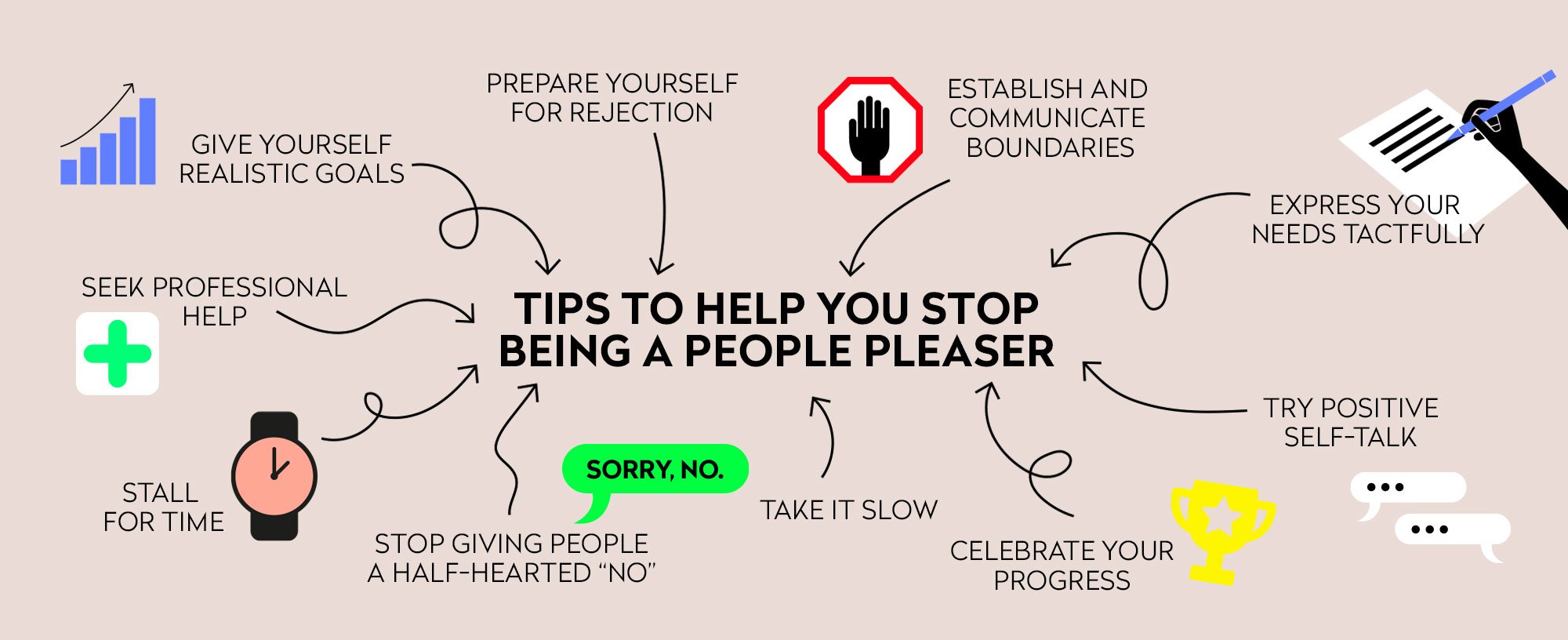How to Stop Being a People-Pleaser
I get it - not many people want to be seen as a negative person. Many of us want to see our actions have a positive impact on the people we interact with and care about.
But this sense of thinking can come back round to bite us in the arse. Especially when it comes to work.
So, to help you walk the fine line between ‘Negative Nancy’ and ‘Pushover Pete’, here is an article on how you can stop yourself being a people-pleaser (at home and at work).
But first, let’s make sure we’re all on the same page with this simple question…
What is a People-Pleaser?
A people-pleaser is someone who goes out of their way to help and support those around them, often at the expense of their own needs.
You might be thinking “hold on, that doesn’t sound like a terrible thing to be called!” And you’re right, there are a lot worse things to be called.
But the problem lies in the fact that people-pleasers will often sacrifice their own time and energy to placate the people in their lives and ultimately earn their approval. This powerful urge can not only damage ourselves, but also our relationships when we start prioritising other people’s needs over our own.
A personality trait known as “sociotropy” is often associated with people-pleasers, as it is characterised as having an excessive investment in interpersonal relationships.
10 Tips to Help You Stop Being a People-Pleaser
01. Establish and Communicate Boundaries
This can sometimes be the hardest step, as it involves some careful introspection. Figuring out your limits is hard, as it’s never clear cut when we exceed them. But think back on past cases where you’ve felt being a people-pleaser has caused problems.
Was it a time when a colleague asked for too much, and you instinctively said yes. Or was it helping someone with a project outside of your usual working hours.
So, think of those times and establish clear boundaries to prevent them from happening again. Now it’s down to communicating them in an effective way to those around you.
This can be simple as establishing a rule of “I’ll only work 7 hours today, anything extra that comes up can be worked on tomorrow.” In the remote working age, this could be as simple as turning off all email and internal comms notifications in the evenings, and sending auto-responders letting people know you will get back to them.
02. Express Your Needs Tactfully
Being assertive doesn’t mean you have to be a jerk. You can tell people what you need without them throwing their toys out the pram. Just remember to do it in an understanding and empathetic way. Explain and give reasons for why you can’t help instead of just saying “no”.
03. Prepare Yourself for Rejection
A lot of people-pleasers tend to be rejection-sensitive. This means they experience sadness, disappointment, or frustration after experiencing rejection. Even if they’re the ones doing the rejecting.
But if you learn to process and confront these feelings, you can reduce the power they have over you.
04. Stop Giving People a Half-Hearted “No”
Have you ever responded to a request with “I’m not sure” when you know the answer is a resounding “no”? This is you being a people-pleaser.
Instead, turn them down with a swift yet polite refusal. Giving people just an inch of wiggle room can turn your “maybe” into an “okay, I’ll do it!”
05. Stall for Time
It can be hard declining on the spot. Especially when you’re still processing the request. Our instincts will make us want to blindly accept, only to find out the grim details later.
The best way to combat this is to give yourself time to process what’s been asked of you. Hit them with some of these go-to lines:
I’ll get back to you on this one.
I’m in the middle of something, I’ll let you know when I’m free.
I’m not sure what’s going on with my capacity – I’ll let you know.
I think I have already have plans for that date, let me check with my partner.
06. Give Yourself Realistic Goals
Make sure you give yourself goals, and that they’re realistic. Focus on what people-pleasing things you do that drain you of time and energy, and think of achievable ways of handling them.
Maybe you want to stop saying yes to working on weekends. But how can you go about doing this? Becoming the boss of the company and creating a new rule banning weekend work might take you a few years…
07. Take it Slow
Changing our behaviour is not something we can do in a single day. It takes time. And we can often be harsh on ourselves when the progress we make feels slow, or seemingly non-existent.
The same goes for those around you who have become accustomed to your people-pleasing ways. Changing their ‘doormat’ perception of you will take a while. While it may be daunting witnessing their reaction to this new you, they’ll come around.
Just remember to take it slow, making small steps as you go. For example, you could start saying “no” more in your emails, eventually working way up to saying “no” in person.
You can also practise in low stakes situations like dealing with requests from your friends, or with handling keen salespeople.
08. Try Positive Self-Talk
Changing your behaviour requires a lot of support. Especially from yourself.
To help you manage and keep to the unlearning process, remember to stay positive and fight in your own corner. Say things like “saying no does not make me a monster” and “my time matters”.
09. Celebrate Your Progress
As I’ve mentioned a thousand times by now: this s#!t ain’t easy. So, give yourself a pat on the back whenever you’ve made even the slightest headway.
You’re already a people-pleaser. So turn those skills round onto yourself.
10. Seek Professional Help
If all else fails, then talking to a therapist might be your best bet. Getting professional help can give you the psychological tools you need to handle letting people down and setting healthy boundaries.
Closing Thoughts
Letting your people-pleasing ways go unchecked can lead to a harmful pattern of self-sacrifice, self-neglect and an overall detrimental impact on your own wellbeing.
Besides wreaking havoc on your personal life, an overabundance of people-pleasing can also lead to work burnout. Which can then send you down a further spiral of anxiety, stress and self-loathing.
Written by Michael
Michael Mauro is the founder of a forward-thinking organisation specialising in leadership, HR and employee development. With over a decade of global experience, Michael has become a leading voice on topics such as culture, inclusion, wellbeing, and the future of leadership.



